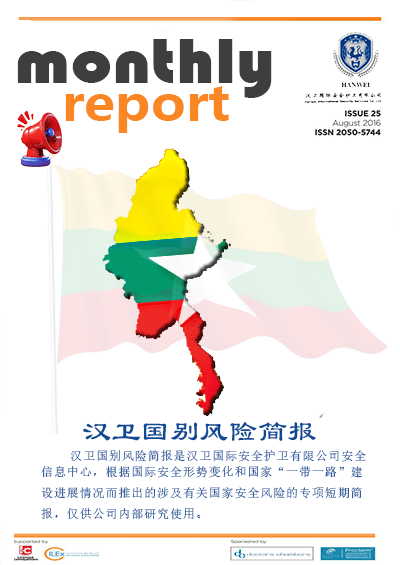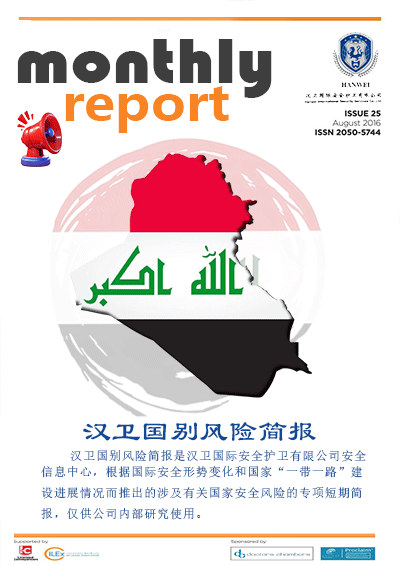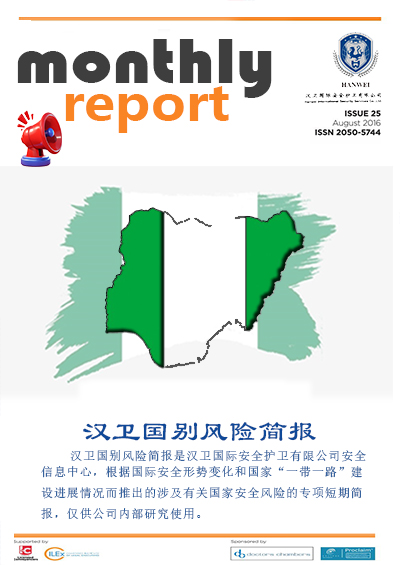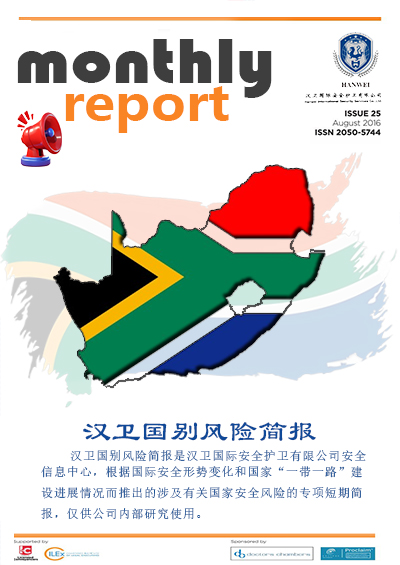Summary of South Africa's Security Situation in August 2025
Overview of South Africa's Security Situation in August
I. Political and Economic Aspects
(I) ANC's GNU Expansion Blocked, Approval Rating Plummets
(II) Multiple Dilemmas Under the Impact of U.S. Tariffs
Agriculture: The agricultural sector, which contributes 3% to South Africa's GDP and provides 5.8% of employment, has been severely hit. The citrus industry alone may lose approximately 35,000 jobs, and farmers' incomes have dropped significantly.
Manufacturing: In the automotive industry, for example, South Africa's auto exports to the U.S. in the first half of 2025 fell by more than 82% year-on-year. On August 29, Ford South Africa announced it would lay off 470 workers, mainly at the Silverton Assembly Plant in Pretoria, Gauteng Province, and the Struandale Engine Plant in Port Elizabeth.
(III) Violent Protests Erupt in Various Parts of South Africa
On August 12, the office building of the Department of Home Affairs under the Ekurhuleni Metropolitan Municipality in Gauteng Province became the "battleground" of a protest conflict, with flames rising high at the scene. It is reported that the protesters were residents evicted from municipal apartments.
On August 13, an e-hailing driver in South Africa was attacked and killed at Maponya Mall in Soweto. On the 14th, a large number of protesters blocked the roads around the mall with bricks in an effort to seek justice for the attacked driver.
II. Social Security Risks
(I) Abduction Incidents
Gauteng Province: Pretoria, a key city in Gauteng Province, has become the "epicenter" of abduction cases nationwide, accounting for more than half of the country's total abductions. Recently, child abductions have increased significantly, and there have even been consecutive cases of five women going missing and being killed, indicating that the local security situation is not to be underestimated. According to relevant sources, there are as many as dozens of abduction cases targeting Chinese nationals in Johannesburg every month, making Chinese people one of the key target groups. On August 19, a Chinese national was abducted in the Aeroton area in southern Johannesburg. The Chinese Embassy in South Africa promptly intervened, but as of the end of August, the abducted Chinese citizen had not yet been rescued.
Western Cape Province: On August 10, a businessman running a tavern in Cape Town was abducted at his home. His body, with obvious injuries, was found two days later.
Eastern Cape Province: In the early morning of August 11, a 73-year-old man was abducted at gunpoint while driving out and his family was extorted for ransom; on August 26, a 62-year-old man was abducted on his way home from work.
(II) Shooting Incidents
On the evening of August 13, a fierce shooting broke out between taxi drivers and e-hailing drivers outside Maponya Mall in southern Johannesburg, Gauteng Province. One e-hailing driver was shot dead, and a passerby and another e-hailing driver were injured by gunfire.
From August 11 to 15, serial shooting incidents occurred in multiple communities in Cape Town, Western Cape Province, resulting in 16 deaths.
On August 21, a shooting incident occurred on OR Tambo Road in Hout Bay, Western Cape Province, killing 2 men and injuring 5 others.
(III) Robbery Incidents
On August 12, South African members of Parliament strongly criticized the insufficient police presence at traffic intersections around Cape Town International Airport, especially on some key highway sections. This shortage has led to frequent robberies, and even incidents of people being shot, targeting tourists and local residents.
According to reports on August 18, a farm in Mpumalanga Province was robbed by 5 armed gangsters the previous week. The gangsters looted multiple cars, household appliances, and dozens of livestock, causing severe negative impacts. The police, in collaboration with multiple departments, successfully arrested 1 suspect.
On August 19, three members of Parliament, including the Chairman of the Police Affairs Committee of the South African Parliament, were attacked in a carjacking after completing a visit. Among them, 2 suffered minor injuries and 1 was seriously injured and hospitalized.
III. Other Aspects
(I) South Africa Continues Spot Checks, with Overseas Chinese Businesses Becoming the Focus of Compliance Supervision
- Closely Monitor Developments to Avoid Political and Economic Security Risks: It is advisable to closely follow local political and economic news, and through information released by the Chinese Embassy in South Africa, government announcements, and social media, avoid areas prone to protests such as government institutions and key transportation hubs as much as possible. When traveling daily, stay away from large crowds to prevent involvement in unexpected conflicts. Given South Africa's current complex political and economic situation, Chinese enterprises are advised to re-evaluate their business strategies, stock up on necessary supplies in advance, and minimize disruptions to business operations caused by transportation blockages and price fluctuations. In terms of employee management, strengthen the planning of employees' commuting routes to and from work, avoiding hotspots of conflict.
- Strengthen Security Precautions to Resist the Threat of Frequent Violent Crimes: In response to the severe situation where Chinese nationals have been frequently targeted by abductions, shootings, and robberies recently, Chinese citizens are advised to remain highly vigilant at all times, avoid traveling at night or in the early morning, and stay away from areas with poor public security such as urban-rural fringe areas and informal settlements. Do not wear overly conspicuous valuable jewelry or carry large amounts of cash when going out. In public places, always be alert to suspicious people and vehicles around you. If you feel followed or threatened, immediately go to crowded places with security personnel.
- Abide by Local Laws and Regulations, and Operate in Compliance with the Law: Recently, many provinces and cities in South Africa have launched large-scale inspections and rectifications of businesses. Chinese businesses and enterprises in South Africa are advised to apply for business licenses in accordance with the law, resolutely refrain from selling counterfeit and shoddy products, and promptly clear out expired food. Strengthen identity verification of employees, and carry necessary identification and business documents with you. Actively cooperate with local law enforcement agencies during inspections. If you encounter unfair treatment during inspections, remain calm, collect evidence, and safeguard your rights and interests through legal and compliant channels.




